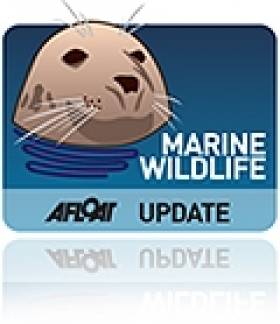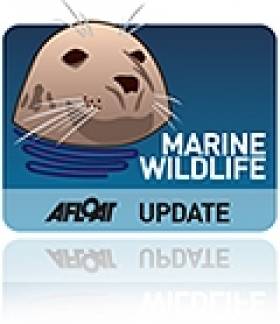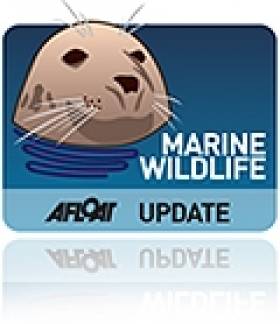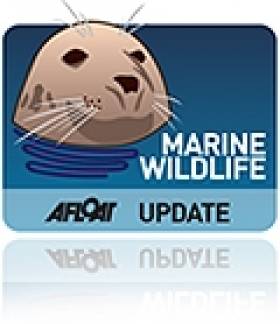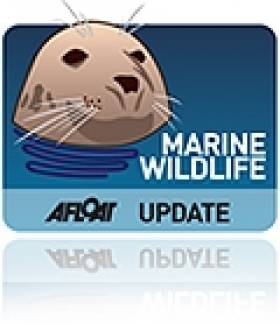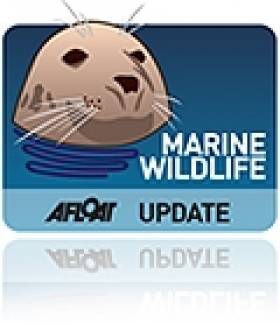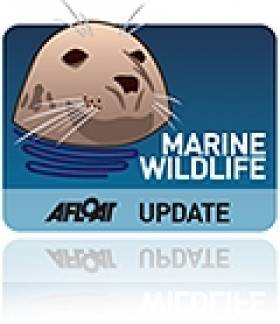Displaying items by tag: pilot whale
Pilot Whale Calf Dies Off North Antrim Coast
#MarineWildlife - A pilot whale calf had to be put down after stranding off the North Antrim coast - just days after a rare whale died while beached in the same region.
The Belfast Telegraph reports that the unweaned juvenile pilot whale became separated from its mother, and was severely malnourished.
"Regrettably for this animal, given that it would be fully dependent on its mother at such an early stage in its life, the inevitable conclusion was that the animal would be unable to survive alone," said a spokesperson for the NI Department of Environment, who had been monitoring the calf in inshore waters near Portballintrae for close to two weeks.
When the whale calf was reported stranded on rocks in Portballntrae Bay on Monday 16 September, the stand-by vet was called in to euthanise the marine giant.
The sad occasion happened just two days after a juvenile Sei whale died after beaching near Waterfoot in Co Antrim.
Whale Rescued In Meath Stranding Drama
#MarineWildlife - Skerries RNLI joined a number of groups in assisting a beached whale back out to sea at Gormanston in Co Meath earlier today (Thursday 20 June).
The volunteer lifeboat crew launched their inshore lifeboat shortly after 10am following reports from the Irish Whale and Dolphin Group (IWDG) that a 25ft pilot whale had beached in the area.
The lifeboat helmed by Joe May, and with crew members Emma Wilson, AJ Hughes and Laura Boylan onboard, made its way to the scene where May got into the sea and helped manoeuvre the whale back into deeper water.
Skerries RNLI then shadowed the whale guiding it out to sea, preventing it from turning back to shore by positioning the boat in its way. The lifeboat did this for about 25 minutes until the mammal was well clear of the shore.
Other agencies on scene included Skerries coastguard, the Defence Forces based at Gormanston, the IWDG, Boyne Fishermen’s Rescue and Irish Coast Guard helicopter Rescue 116.
Meanwhile, RTÉ News reports that a second whale was found dead on the beach near Mornington, north of Bettystown.
Despite initial fears that the whale was the same one rescued in the morning, it was later determined to be a different creature.
16 Pilot Whales Die in Scotland Mass Stranding
#MARINE WILDLIFE - Marine wildlife experts are investigaing the causes of a mass stranding of pilot whales at Fife in eastern Scotland at the weekend.
The Press Association reports that 16 whales from a 26-strong group died when they stranded on a beach near St Andrews on the morning of Sunday 2 September. Three of those that died were calves.
More than 50 volunteers assisted members of the RNLI and vets from British Divers Marine Life Rescue (BDMLR) in refloating the other 10 whales at high tide yesterday afternoon, in what BDMLR co-ordinator Ali Jack described as "a fantastic effort".
Rescuers used specialist pontoons brought in from across Scotland as well as Newcastle and Cumbria in northern England.
According to The Guardian, some 24 whales from the same pod were spotted in the shallows further along the coast at Cellardyke and are under close observation.
A Forth coastguard spokesman said that vets would return to the beach this morning to carry out post-mortems on the whale carcasses to find any indication of what might have caused them to come so close to the shore.
The spokesman told The Guardian: "It is a very rare occurrence in Scotland and very sad. The usual scenario would be that the whale that is leading the group has become ill, or has lost its way, and gets beached and the rest will follow on, although we do not know for sure if that is what happened."
The incident brings back memories of last year's mass stranding of 44 pilot whales in the Scottish Highlands, as previously reported on Afloat.ie.
Twenty-five whales from that pod died at the Kyle of Durness, in a tragedy that mirrored the deaths of 33 whales in a similar mass beaching in Donegal in late 2010.
Clare Beach 'Narwhal' Was No Such Beast, Experts Confirm
#MARINE WILDLIFE - The mystery creature washed up on a Co Clare beach last month has been confirmed to be a long-finned pilot whale, and not a narwhal as had been alleged.
As previously reported on Afloat.ie, the situation was a source of puzzlement for the Irish Whale and Dolphin Group (IWDG) as the carcass was removed from Liscannor beach before their scientists could examine the remains.
Experts had been hoping to verify an eyewitness report that the carcass was indeed that of a narwhal, an Arctic cetacean renowned for its unicorn-like tusk. It would have been the first recorded sighting of a narwhal in Irish waters.
But RTÉ News reports that images sent to the IWDG confirm at last the identity of the animal as a long-finned pilot whale.
It marks the fourth reported stranding of a pilot whale in Co Clare and the 16th around Ireland this year alone.
The IWDG added that it was "always sceptical that the whale was a narwhal", and said Clare County Council did not deserve the criticism it received for removing the carcass over public health concerns.
Whales, Dolphin Found Beached on West Coast
#MARINE WILDLIFE - Three whales and a dolphin were found beached over the past few days along Ireland's west coast, according to the Belfast Telegraph.
Dr Simon Berrow of the Irish Whale and Dolphin Group confirmed that reports had been received of a bottlenose whale on White Strand in Co Clare, a pilot whale on Fintra Beach in Co Donegal and a dolphin in Silverstrand, Co Galway - all found dead.
The latest find was a male sperm whale stranded on Omey Island in Co Galway, shed of its skin and with a broken lower jaw.
"Chances are it died offshore and got washed in with the wind," said Berrow.
The IWDG said such strandings were relatively common, although as reported on Afloat.ie earlier this year there has been growing concern over the rising number of dolphin deaths along the south coast in particular.
Sonar Possible Culprit in Whale Death Tragedy
Sonar activity by Royal Navy submarines may have caused the deaths of up to 35 pilot whales off the coast of Co Donegal at the weekend, an expert has claimed.
Dr Simon Berrow of the Irish Whale and Dolphin Group (IWDG) said that naval activity in the area is one possible cause of the tragedy.
"Naval exercises use a low frequency active sonar which is known to affect whales very badly," he told the Belfast Telegraph. "Basically it affects their sonar and causes a gas embolism, like the ‘bends’."
The Telegraph reports that tests are still being carried out to determine if the whales that beached on Rutland Island, near the fishing village of Burtonport, are the same as a group monitored in Scotland's outer Hebrides the previous weekend.
The pilot whales had reportedly been swimming off Co Donegal for the past week before they were found dead.
The Belfast Telegraph has more on the story (with photos) HERE.
Post Mortem on Mass Pilot Whale Strandings Cancelled Due to Bad Weather
Plans to carry out a post-mortem examinations on thirty-five Pilot whales found dead on a beach in Co Donegal yesterday have been cancelled due to bad weather according to Dr. Simon Berrow of the Irish Whale and Dolphin Group (IWDG).
Up to thirty-five Pilot whales were found dead on a beach in Co Donegal. The whales were discovered on Rutland Island near Burton port yesterday afternoon on a beach and have been confirmed as pilot whales, mostly mothers and calves.
A team from the Galway-Mayo Institute of Technology led by Dr Ian O'Connor and the Irish Whale and Dolphin Group are planning to travel to record length, gender and obtain photographs to see if they can be matched to the recently observed Scottish animals. Skin samples and teeth will also be collected for genetics and life-history studies.
According to locals the whales had been seen feeding in the area around Aranmore Island since Tuesday.
A group of around 30 pilot whales were monitored in South Uist in the outer Hebrides, Scotland last weekend for fear of their live-stranding. The IWDG believe it may be the same group.
Pilot whales have a tendency to strand themselves in large numbers and a similar incident occurred in Co Mayo a few years ago. In June Cape Verde islanders abandoned hope for the survival of 92 pilot whales that were found washed up in a mass beaching. In September in New Zealand at least 25 pilot whales died after beaching themselves in a north Wellington bay as rescuers battled to save almost 50 more stranded.
RTE News has pictures HERE


























